LGMN Antibody (N-term)
Affinity Purified Rabbit Polyclonal Antibody (Pab)
- SPECIFICATION
- CITATIONS
- PROTOCOLS
- BACKGROUND

Application
| WB, E |
|---|---|
| Primary Accession | Q99538 |
| Other Accession | Q4R4T8, NP_005597.3 |
| Reactivity | Human |
| Predicted | Monkey |
| Host | Rabbit |
| Clonality | Polyclonal |
| Isotype | Rabbit IgG |
| Calculated MW | 49411 Da |
| Antigen Region | 83-112 aa |
| Gene ID | 5641 |
|---|---|
| Other Names | Legumain, Asparaginyl endopeptidase, Protease, cysteine 1, LGMN, PRSC1 |
| Target/Specificity | This LGMN antibody is generated from rabbits immunized with a KLH conjugated synthetic peptide between 83-112 amino acids from the N-terminal region of human LGMN. |
| Dilution | WB~~1:1000 E~~Use at an assay dependent concentration. |
| Format | Purified polyclonal antibody supplied in PBS with 0.09% (W/V) sodium azide. This antibody is purified through a protein A column, followed by peptide affinity purification. |
| Storage | Maintain refrigerated at 2-8°C for up to 2 weeks. For long term storage store at -20°C in small aliquots to prevent freeze-thaw cycles. |
| Precautions | LGMN Antibody (N-term) is for research use only and not for use in diagnostic or therapeutic procedures. |
| Name | LGMN {ECO:0000303|PubMed:30425301, ECO:0000312|HGNC:HGNC:9472} |
|---|---|
| Function | Has a strict specificity for hydrolysis of asparaginyl bonds (PubMed:23776206). Can also cleave aspartyl bonds slowly, especially under acidic conditions (PubMed:23776206). Involved in the processing of proteins for MHC class II antigen presentation in the lysosomal/endosomal system (PubMed:9872320). Also involved in MHC class I antigen presentation in cross-presenting dendritic cells by mediating cleavage and maturation of Perforin-2 (MPEG1), thereby promoting antigen translocation in the cytosol (By similarity). Required for normal lysosomal protein degradation in renal proximal tubules (By similarity). Required for normal degradation of internalized EGFR (By similarity). Plays a role in the regulation of cell proliferation via its role in EGFR degradation (By similarity). |
| Cellular Location | Lysosome. |
| Tissue Location | Ubiquitous. Particularly abundant in kidney, heart and placenta. |

Thousands of laboratories across the world have published research that depended on the performance of antibodies from Abcepta to advance their research. Check out links to articles that cite our products in major peer-reviewed journals, organized by research category.
info@abcepta.com, and receive a free "I Love Antibodies" mug.
Provided below are standard protocols that you may find useful for product applications.
Background
This gene encodes a cysteine protease that has a strict specificity for hydrolysis of asparaginyl bonds. This enzyme may be involved in the processing of bacterial peptides and endogenous proteins for MHC class II presentation in the lysosomal/endosomal systems. Enzyme activation is triggered by acidic pH and appears to be autocatalytic. Protein expression occurs after monocytes differentiate into dendritic cells. A fully mature, active enzyme is produced following lipopolysaccharide expression in mature dendritic cells. Overexpression of this gene may be associated with the majority of solid tumor types. This gene has a pseudogene on chromosome 13. Several alternatively spliced transcript variants have been described, but the biological validity of only two has been determined. These two variants encode the same isoform.
References
Clerin, V., et al. Atherosclerosis 201(1):53-66(2008)
Liu, Z., et al. Mol. Cell 29(6):665-678(2008)
Oh, J.H., et al. Mamm. Genome 16(12):942-954(2005)
Dusso, A.S., et al. Am. J. Physiol. Renal Physiol. 289 (1), F8-F28 (2005) :
Murthy, R.V., et al. Clin. Cancer Res. 11(6):2293-2299(2005)
If you have used an Abcepta product and would like to share how it has performed, please click on the "Submit Review" button and provide the requested information. Our staff will examine and post your review and contact you if needed.
If you have any additional inquiries please email technical services at tech@abcepta.com.













 Foundational characteristics of cancer include proliferation, angiogenesis, migration, evasion of apoptosis, and cellular immortality. Find key markers for these cellular processes and antibodies to detect them.
Foundational characteristics of cancer include proliferation, angiogenesis, migration, evasion of apoptosis, and cellular immortality. Find key markers for these cellular processes and antibodies to detect them. The SUMOplot™ Analysis Program predicts and scores sumoylation sites in your protein. SUMOylation is a post-translational modification involved in various cellular processes, such as nuclear-cytosolic transport, transcriptional regulation, apoptosis, protein stability, response to stress, and progression through the cell cycle.
The SUMOplot™ Analysis Program predicts and scores sumoylation sites in your protein. SUMOylation is a post-translational modification involved in various cellular processes, such as nuclear-cytosolic transport, transcriptional regulation, apoptosis, protein stability, response to stress, and progression through the cell cycle. The Autophagy Receptor Motif Plotter predicts and scores autophagy receptor binding sites in your protein. Identifying proteins connected to this pathway is critical to understanding the role of autophagy in physiological as well as pathological processes such as development, differentiation, neurodegenerative diseases, stress, infection, and cancer.
The Autophagy Receptor Motif Plotter predicts and scores autophagy receptor binding sites in your protein. Identifying proteins connected to this pathway is critical to understanding the role of autophagy in physiological as well as pathological processes such as development, differentiation, neurodegenerative diseases, stress, infection, and cancer.



